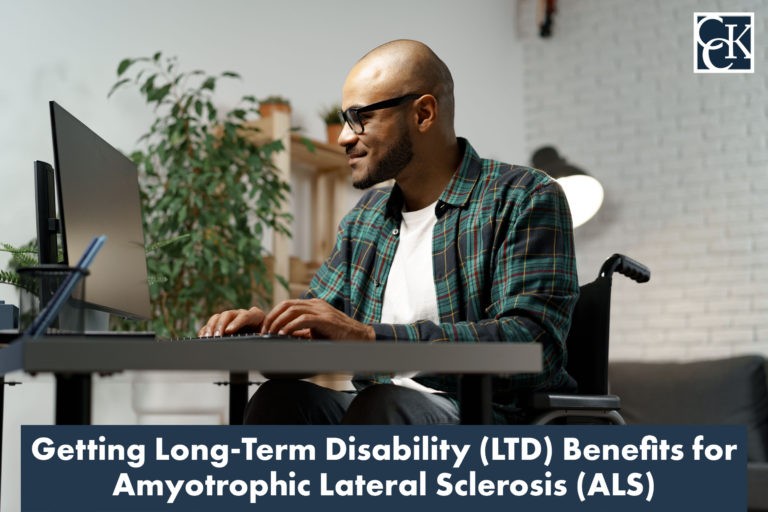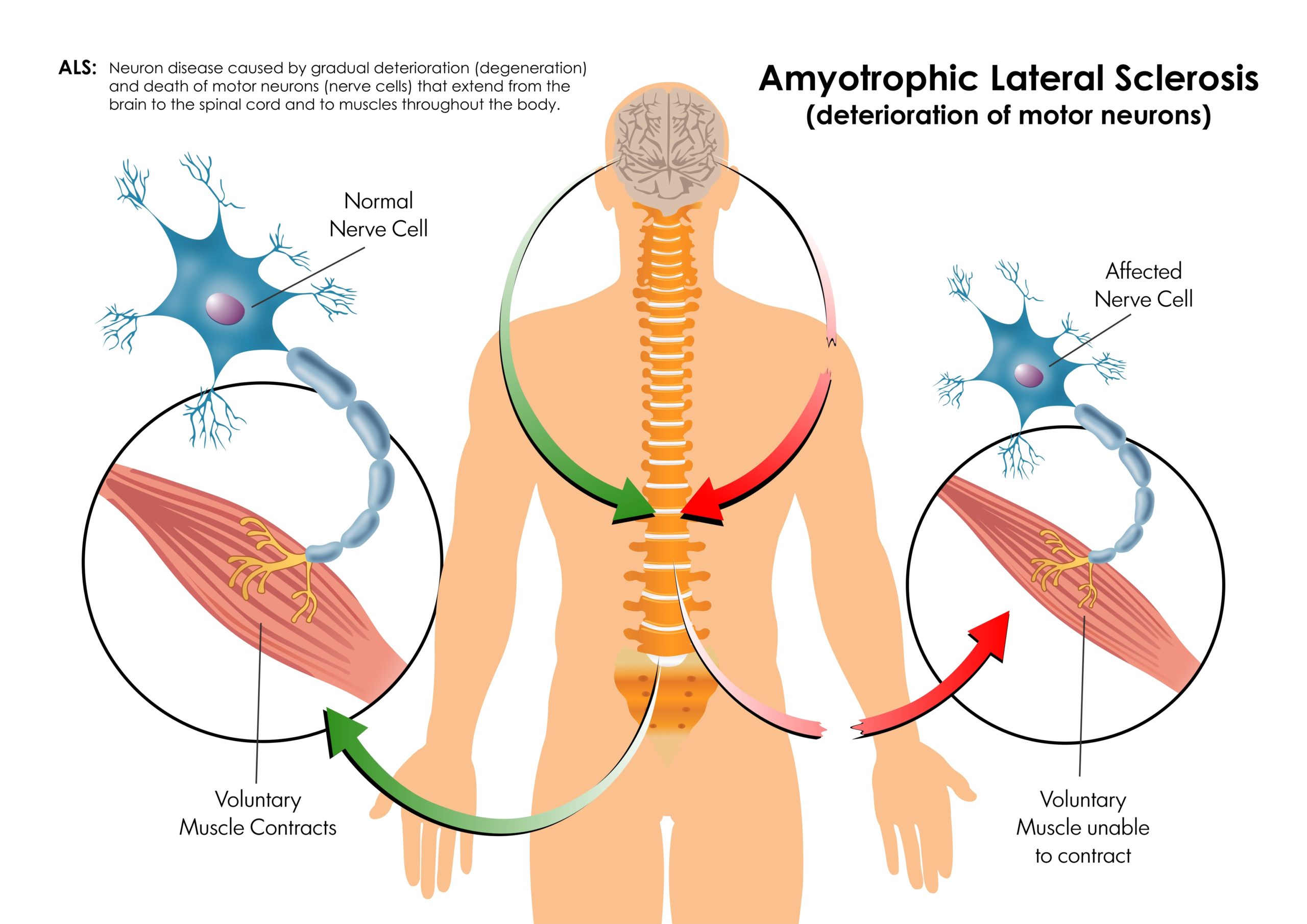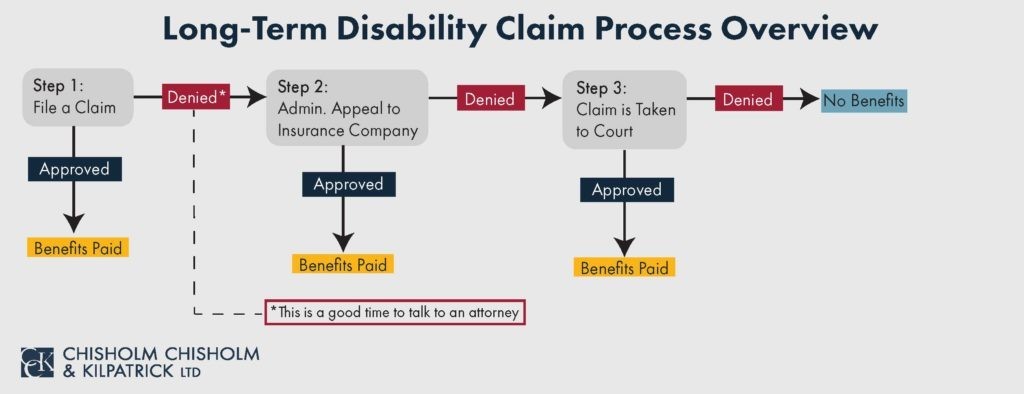Getting Long-Term Disability (LTD) Benefits for Amyotrophic Lateral Sclerosis (ALS)

Amyotrophic lateral sclerosis, or ALS, is a progressive neurodegenerative disease that affects the nerve cells of the brain and spinal cord. ALS is also commonly known as Lou Gehrig’s disease, after the baseball player who first brought national attention to ALS when it ended his career in 1941.
ALS causes the loss of muscle control needed to move, breathe, eat, function independently, and eventually leads to severe physical debilitation and paralysis. There is no cure for this disease.
Facing a diagnosis of ALS can be difficult and devastating, and the team of attorneys at Chisholm Chisholm & Kilpatrick understand how this can be a distressing time. If you have been diagnosed with ALS and need to file claim for long-term disability (LTD) insurance, our team is available to assist you.
For a free consultation with a CCK long-term disability lawyer, you can call us at 800-544-9144 for a complimentary consultation.
What is Amyotrophic Lateral Sclerosis?
ALS is marked by the degeneration of nerve cells in the brain and spinal cord. This leads to a loss in connection between muscles and the brain, which causes the deterioration of muscles throughout the body. ALS typically has a gradual onset, beginning with muscle twitching, numbness, and weakness in limbs before leading to severe impairment. Initial symptoms can vary greatly between people.
ALS is hereditary in 5 to 10 percent of cases. In the remaining 90 to 95 percent of cases, the cause is unknown, and anyone can develop the disease. The risk for ALS increases with age and most commonly occurs in people between the ages of 40 and 70, though it can occur at any age.
ALS is slightly more common in men than in women, and military veterans are up to twice as likely to be diagnosed with ALS than the average person. It is speculated that toxin exposure, such as exposure to lead, may increase the risk of ALS, though there is currently no decisive evidence.
Over time, ALS paralyzes essential muscles in the body, such as those necessary to breathe, eat, and speak. As ALS progresses, you may lose the ability to walk, lift things, and even control emotional responses, before you reach a state of severe paralysis. ALS can also lead to dementia, which can cause memory loss and behavioral changes.
Unfortunately, the average life expectancy of someone with a diagnosis of ALS is about 2-5 years, though some people may go on to live for ten or more. While somewhat of a miraculous exception to typical cases of ALS, the famous physicist Stephen Hawking lived with ALS for 55 years before he died in 2018.
Symptoms of ALS
Symptoms of ALS vary depending on the muscles affected, and they often progress gradually. Signs of ALS can begin with the failure to do things as simple as holding a pen or buttoning your shirt. Other general symptoms may include:
- Weakness in limbs
- Muscle twitching
- Muscle cramps
- Tripping, falling, or clumsiness
- Slurred speech or change in vocal pitch
- Difficulty chewing or swallowing
- Difficulty holding or gripping objects
- Inappropriate emotional reactions, such as crying, laughing, or yawning
- Cognitive or behavioral changes, such as memory loss
Diagnosis of ALS
ALS can be difficult to diagnose, especially in its earlier stages, because its symptoms overlap with other neurological diseases. There is no one test that will confirm ALS, and it often requires a series of tests used to rule out other neurological diseases.
Such tests may include:
- Electromyogram: Your doctor will insert a needle electrode into various muscles to evaluate their electrical activity.
- Nerve conduction study: This will measure the ability of your nerves to send impulses to muscles in different areas of your body.
- MRI: Imaging of your brain and spinal cord which can reveal tumors, herniated disks, or other conditions of the brain and spine.
- Spinal tap: The removal of fluid from your spine which can test for infections or disorders.
- Muscle biopsy: A small portion of your muscle is removed and sent to a lab for evaluation.
- Neurological exam: Evaluation of your reflexes, coordination, balance, mental status, and a sensory check.

Treatment of ALS
There is no cure for ALS, but treatment can attempt to slow the progression of symptoms and make them more bearable. Two drugs are currently approved for fighting ALS: riluzole, which changes the way certain substances affect nerves and muscles, and edaravone, which slows nerve damage and may delay the decline of daily functioning. Other medications may be prescribed to alleviate symptoms, but do not halt the progression of the disease.
Therapies may also be used to treat ALS. Physical therapy may be used to help you maintain your strength and range of motion for as long as possible. Occupational therapy may provide you with adaptive techniques and equipment to help you perform independent activities up to a point.
In speech therapy, you can learn adaptive techniques in speaking as your muscles weaken, as well as adjust to other methods of communication, such as an alphabet board. Therapy for your mental health may also be necessary to help you cope with the emotions and life changes that ALS brings.
As your muscles weaken, you may eventually be given devices that help you breathe. Some choose mechanical ventilation, which is when a tube is inserted into a surgically created hole at the base of your neck leading into your windpipe.
Amyotrophic Lateral Sclerosis (ALS) and Your Long-Term Disability Claim
While you may be able to continue working at first, as your ALS progresses, it may begin to limit or completely prohibit you from working. You will likely want to file a long-term disability claim as soon as possible, which will cover all or a percentage of your earnings when you are no longer able to work.

Given the destructive nature of the disease, it may seem that ALS could be cause for an easy long-term disability case. However, it is essential that you provide the strongest possible evidence to your insurance company. You will want to submit medical records that formally state your diagnosis, vocational evidence, as well as any supporting reports from your doctor.
Your doctor may be able to outline specific symptoms of your disease, such as difficulty lifting objects, an inability to walk, or breathing complications. You may have lost the ability to function independently, or your cognition may be declining. You will want to document as many of your symptoms as possible to submit as evidence for your claim.
Additionally, treatments can also cause disabling side effects. Riluzole can cause dizziness, liver function changes, and gastrointestinal dysfunction. Edaravone may cause headaches, shortness of breath, and bruising. Doctor appointments and therapy can cause you to miss time out of work, which can also be documented in your claim.
The attorneys at CCK understand that a diagnosis of ALS can be debilitating mentally, and can lead to depression and anxiety, which can also contribute to your claim. As such, CCK wants to help relieve any stress possible and is prepared to take on the commitment of your long-term disability claim and to help you meet your definition of disability. Our team is available to help at any point in the process.
Chisholm Chisholm & Kilpatrick Can Help You with Your Long-Term Disability Claim for ALS
The legal team at CCK understands how ALS can change your life. We want to do what we can to help ease the burden of your LTD claim so that you do not have to worry about your income. Our team will evaluate your claim, gather evidence, and handle the communication between you and your insurance company.
Our attorneys are also knowledgeable in ERISA law, which often puts strict requirements on long-term disability claims. Under ERISA, the appeal stage is the last chance you will have to get evidence on the record, and if you miss any deadlines, it can result in a denial of benefits. We will ensure that your strongest evidence is submitted and that everything is completed in a timely manner.
CCK knows that facing ALS is a hard battle, and we are dedicated to helping you fight for the long-term disability benefits to which you are entitled. Contact us at 800-544-9144 for a free consultation to see if we may be able to assist you.
Share this Post

